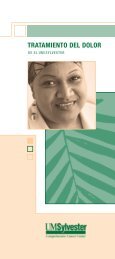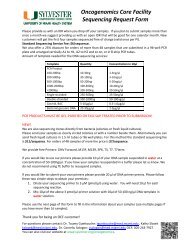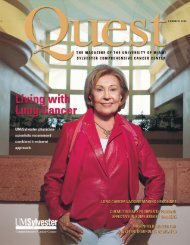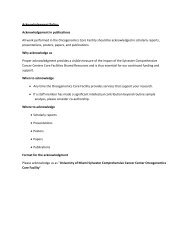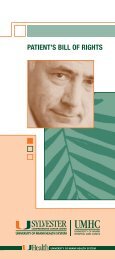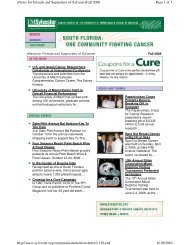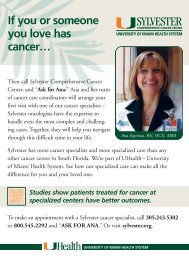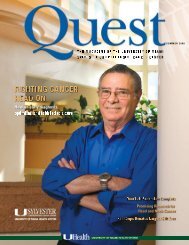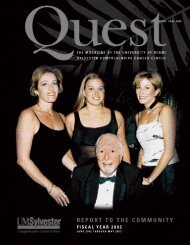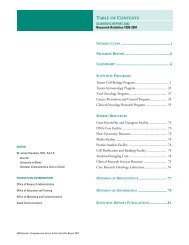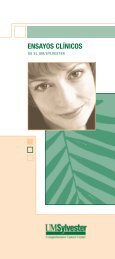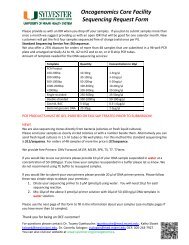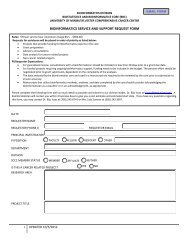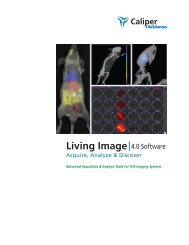SCIENTIFIC REPORT 2004 - Sylvester Comprehensive Cancer Center
SCIENTIFIC REPORT 2004 - Sylvester Comprehensive Cancer Center
SCIENTIFIC REPORT 2004 - Sylvester Comprehensive Cancer Center
You also want an ePaper? Increase the reach of your titles
YUMPU automatically turns print PDFs into web optimized ePapers that Google loves.
C A N C E R P R E V E N T I O N A N D C O N T R O L P R O G R A M<br />
• Findings suggest that maintaining a positive<br />
attitude may relate to psychological well-being<br />
over the year post surgery.<br />
An additional study revealed that there were<br />
complex relationships between benefit-finding<br />
and coping over the one-year period following<br />
surgery for early stage breast cancer.<br />
• During the early period of dealing with the diagnosis<br />
of and treatment for breast cancer, for<br />
example, benefit-finding is associated with<br />
greater positive reframing, religious coping, selfdistraction,<br />
substance use, examining emotions,<br />
and seeking less social support. By mid-treatment<br />
(three months later), active coping and<br />
religious coping were important correlates of<br />
benefit-finding, while after treatment completion<br />
(six months), higher benefit-finding was<br />
related to greater active coping, examining emotions,<br />
seeking social support, religious coping,<br />
and reduced use of acceptance coping. However,<br />
by one year after surgery, greater benefitfinding<br />
was associated with using positive<br />
reframing and planning coping strategies.<br />
• Thus, effective coping strategies early on may be<br />
those that help women modulate their emotions<br />
and maintain hope. Later on, the most<br />
effective strategies appear to be those that help<br />
them move on and plan for the future.<br />
• The research outcome suggests that finding<br />
benefits in cancer may be differentially related<br />
to the coping strategies women employ at different<br />
points during the treatment trajectory,<br />
which may have important implications for tailoring<br />
psychosocial interventions across medical<br />
treatment.<br />
DAVID J. LEE, PH.D.<br />
Associate Professor of Epidemiology and<br />
Public Health<br />
DESCRIPTION OF RESEARCH<br />
Dr. Lee is a chronic disease epidemiologist<br />
with a long-standing interest in the prevalence<br />
of, and morbidities associated with, sensory-related<br />
diseases and impairments. In the past<br />
two years, he has published findings that examined<br />
cancer mortality risk in community-residing<br />
adults with visual impairment and glaucoma. Previous<br />
research has suggested an association between<br />
cancer risk and eye disease. Dr. Lee and his<br />
colleagues found, however, that detection bias, in<br />
part, might be responsible for this association.<br />
Their findings were of sufficient merit to warrant<br />
publication of an accompanying editorial by a<br />
leading ophthalmic epidemiologist.<br />
Dr. Lee entered the field of tobacco control<br />
research in 2000, where he now devotes 60 percent<br />
of his research efforts. Since this career shift,<br />
he has served as co-investigator of the Florida<br />
Youth Cohort Study that is following a sample of<br />
Florida adolescents in order to monitor changes<br />
in tobacco-related attitudes/beliefs and behaviors.<br />
He also is the lead author on three papers reporting<br />
results from this work. Dr. Lee also is the<br />
principal investigator of two Flight Attendant<br />
Medical Research Institute (FAMRI)-funded<br />
grants to study the influence of second-hand<br />
smoke on the health of adolescents. Using<br />
UM/<strong>Sylvester</strong> developmental funds, Dr. Lee<br />
fielded a school-based pilot study in <strong>2004</strong> that<br />
examined second-hand smoke exposure and cancer<br />
risk factors in an ethnically diverse group of<br />
middle-school students. Findings from this study<br />
will be used to develop an intervention designed<br />
to reduce cancer risk factors in this population.<br />
It will be submitted for possible funding to the<br />
NCI in February 2005.<br />
22<br />
UM/<strong>Sylvester</strong> <strong>Comprehensive</strong> <strong>Cancer</strong> <strong>Center</strong> Scientific Report <strong>2004</strong>



